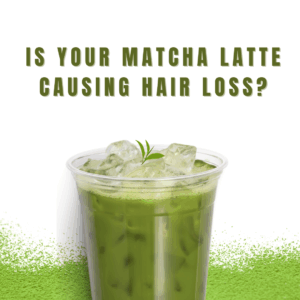Is Your Favorite Matcha Latte Harming Your Hair?
If you’ve been scrolling through TikTok, Instagram, or any wellness corner of the internet lately, you might have seen it trending: “Is my matcha latte making my hair fall out?” Yes, really. The same green drink that’s supposed to boost focus, calm your mind, and make you feel like a wellness influencer has now been accused of sabotaging your strands. Social media never fails to entertain, but also misinform.
 Here’s the reality…your hair isn’t leaving because of your daily matcha fix. Genetics are the real culprit. Most hair loss, especially pattern hair loss, is progressive and DNA-driven. That tiny bit of shedding in the shower? It might be the first sign of something bigger if left untreated. Hair loss doesn’t happen overnight, it creeps in slowly, and catching it early is the real power move.
Here’s the reality…your hair isn’t leaving because of your daily matcha fix. Genetics are the real culprit. Most hair loss, especially pattern hair loss, is progressive and DNA-driven. That tiny bit of shedding in the shower? It might be the first sign of something bigger if left untreated. Hair loss doesn’t happen overnight, it creeps in slowly, and catching it early is the real power move.
Yes, matcha can slightly affect iron absorption, but this is only relevant in very specific cases, like people already low in iron. Blaming your latte? That’s a vibe, but it’s not reality.
So many people are getting their “hair advice” from social media, forums, or wellness hacks instead of talking to a professional. By the time thinning becomes obvious, they may have already missed the window for early treatment that could have preserved most of their hair. Hair loss is progressive, and once it’s noticeable, reversing it becomes more complicated. Early intervention is key, it’s the difference between maintaining full density and playing catch-up later.
At Leonard Hair Transplant Associates, we see this all the time. That’s why we offer free virtual and in-person consultations to evaluate hair loss at its earliest stages. Our approach isn’t just about diagnosing, it’s about giving you a clear, proven plan tailored to your hair, your lifestyle, and your goals. The earlier you act, the more you can slow, stop, or even reverse thinning. That’s something scrolling through social media can’t promise.
So next time someone’s freaking out about matcha-induced baldness, remember that the real culprit is probably your genes, not your cup. Don’t let misinformation or trendy “wellness” advice keep you from starting treatment that actually works. Hair loss is progressive, but with early, expert care, you can stay ahead of it and keep your hair looking full.
Dr. Matthew Lopresti

